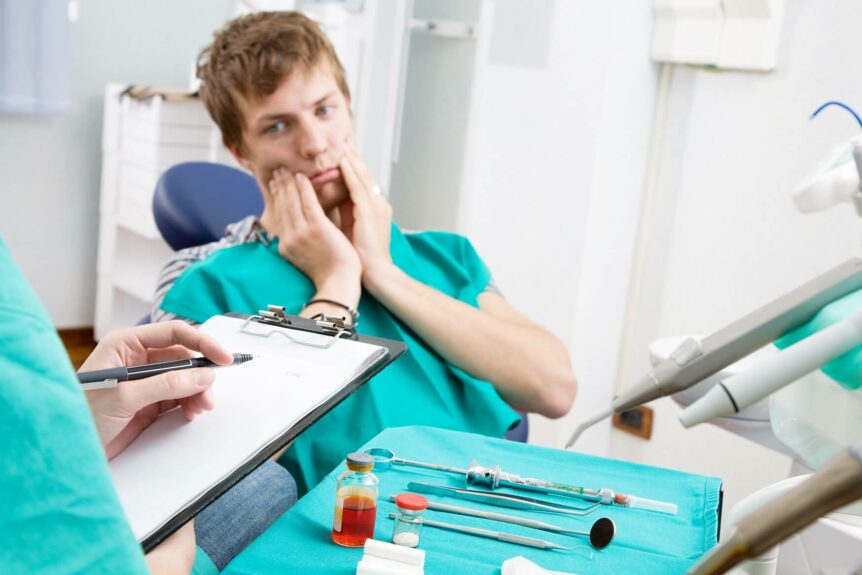If you’ve suffered from or are currently experiencing dental trauma, please make an appointment with an emergency dentist immediately.
What is dental trauma?
Dental trauma is an injury to the teeth, gums, or nearby tissue, such as the lips and tongue. It’s quite broad in scope and can range from major (avulsed teeth) to minor (chipped teeth) injuries. Any type of trauma can cause tooth trauma, including motorbike accidents, motor vehicle collisions, sparring accidents, and sporting injuries. We’ll explore the variety of different dental traumas, explaining their symptoms and treatments.
Tooth fractures or chips
If you feel pain when eating or when the temperature changes, it’s possible that you’ve got a tooth fracture. A chipped tooth is relatively easy to repair, and generally involves reattaching the piece which has been broken off or replacing it with another tooth-colored material. There’s much more variety when it comes to tooth fractures. From the harmless ‘craze lines’ to fractured cusps and cracked teeth, which require significantly more advanced care: the type of treatment that you need depends heavily on the type of dental trauma that your teeth have sustained. In cases where the tooth fracture has extended all the way down to the root, the tooth may need to be extracted, so that it can cause no further damage to the gums or bone.
Luxated teeth
When a tooth is luxated it essentially means that the tooth has been dislodged. After trauma, the tooth can end up being pushed out of the socket (extrusive luxation), further into the socket (intrusive luxation), sideways within the socket (lateral luxation), or knocked loose within the socket (subluxation). Treatment varies depending on the severity of the damage:
- The tooth can be gently pushed back into place by hand.
- Alternatively, root canal treatment may be necessary if the tooth pulp has started to die.
Avulsed teeth
A tooth which has been completely knocked out of its socket is referred to as an avulsed tooth. It’s often caused by trauma to the mouth (such as a sporting injury or motor vehicle collision) and requires immediate treatment for the tooth to be saved. The prognosis depends on a couple of different factors, including:
- How long the tooth was outside of the mouth for (over 60 minutes can result in the death of periodontal ligament cells).
- The medium in which it was stored (milk is best, but it’s most important that the tooth does not dry out, otherwise the periodontal ligament won’t survive). If possible, the tooth should be immediately replanted into the socket after it’s been washed off.
- How the tooth was carried (by the crown is preferable to the root).
- Whether the tooth was re-inserted immediately (this is the best course of action).
Root fractures
Root fractures are one of the most serious forms of dental trauma. If your teeth feel tender and there’s pain when you eat, you may have sustained a vertical root fracture. Fractures close to the tip of the root are better for your chances of saving the tooth, while fractures close to the tooth’s gum line can pose a variety of problems. Generally, treatment involves splinting the tooth over a period of around 4 weeks to stabilize it. For some fractures, however, a longer stabilization time is necessary.
Prevention
Dental trauma is difficult to prevent against because it’s usually the result of an accident. Nevertheless, there are things that you can do – particularly when taking part in sporting or high-risk events – to keep yourself protected. One of the easiest is to wear a well-fitted mouth guard, something which can protect you from tooth trauma even when you’re in physical situations. Other preventative measures include:
- Wearing a seatbelt when you drive.
- Wearing a helmet or head guard during physical sports activities.
- Have regular check-ups – healthy teeth generally recover faster than unhealthy teeth.
In virtually all cases of dental trauma, the most important factor in being able to save your tooth is the timeliness of treatment. Westover Hills Family can put you in touch with the best emergency dentists in your local area, so be sure to contact us as soon as possible.

